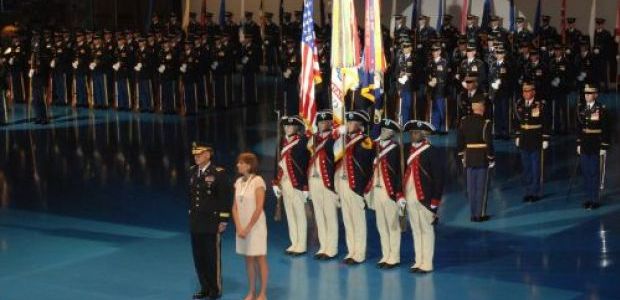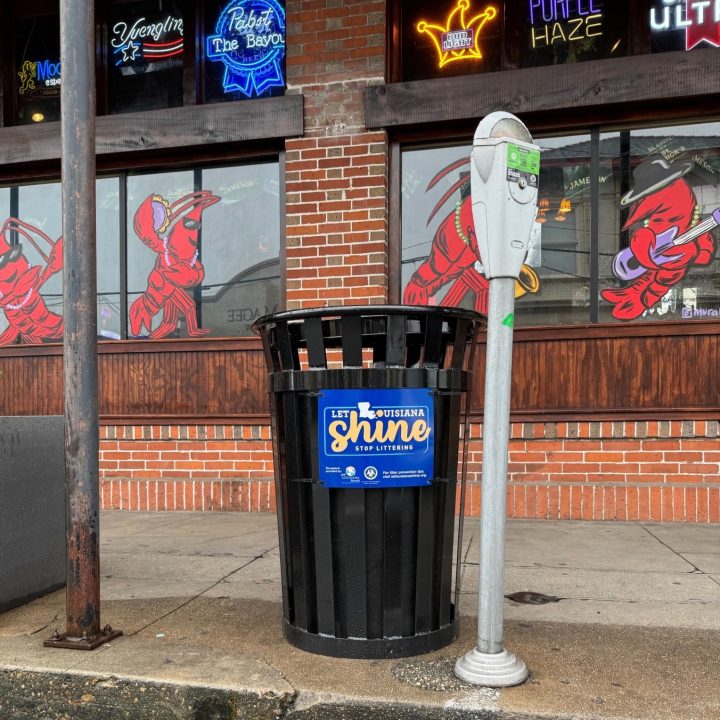Lawsuit seeks T’bonne School Board public notices
September 5, 2013Billiot and Nacio. No joke.
September 5, 2013It’s a long way from Bayou Terrebonne to West Point’s Hudson River home, and from there to Washington D.C.’s Potomac River.
But one H.L. Bourgeois High School graduate made precisely that journey over the past 37 years, ending a stellar career as the boss of the U.S. Army’s judicial system last month with a flourish of pomp and pageantry.
Lt. Gen. Dana Chipman, HLB Class of 1976, officially retired last month as the Army’s Judge Advocate General. The position, which he held for four years, involved overseeing the work of JAGs throughout the service branch.
The JAG is the highest-ranking army lawyer and commander of the Judge Advocate General’s Corps, which provides legal services and support to the Army. The JAG corps predates the nation itself, having been founded by Gen. George Washington in 1775.
Upon gradation from HLB, Chipman attended West Point, graduating as a 2nd Lieutenant.
“I think if I had a goal coming out of West Point it would have been to serve my five years and in the back of my mind I always thought I wanted to go to law school. I did consider leaving West Point after my sophomore year, and I visited LSU to see about law school. But I knew for me staying at West Point was the right call.”
As part of the Army’s in-service program for developing its attorneys, Chipman attended Stanford University Law School. After assignment to the JAG corps, he rose through the ranks.
Although his time spent living in Louisiana was brief – he only went to HLB for his senior year of high school – Chipman made an impression there. His former principal, LP Bordelon, arranged for the Terrebonne Parish School Board to honor Chipman for his service to country. The board issued a recognition of Chipman’s service Aug. 20. Terrebonne also made an impression on the military man.
“It has a sense of place and a sense of home,” he said this week in a telephone interview. “It is like no place I have ever lived. The people from there genuinely care about good times and about people, and not necessarily in that order.”
Chipman’s stint as chief JAG came at a time in the nation’s history that could be described as anything but good times.
U.S. military actions in Afghanistan and Iraq posed special challenges for Army lawyers, including several high profile cases that were brought on Chipman’s watch.
The capital prosecution of Maj. Nidal Hassan, convicted of murdering 13 service members at Fort Hood in 2009, and the prosecution of Staff Sgt. Robert Bales, who pleaded guilty to slaughtering 16 Afghan civilians and was sentenced to life in prison, were conducted under Chipman’s command.
Prior to his appointment to the top spot, Chipman was often involved with development and legal testing of engagement rules employed by military personnel.
A lifetime friend Chipman made at West Point, Steve Peaslee, has facilitated communications between the general and his old friends in Terrebonne. He has nothing but praise for his long-time buddy.
“He always had a higher sense of humor, more refined than the rest of us, which helped at West Point,” the former classmate said, explaining that those early days gave hints of Chipman’s leadership abilities. “There is a lot of tension at West Point to be diffused and the person who can take those situations and make them funny for the rest of us goes a long way.”
As he leaves his position, Chipman notes that he had the privilege of commanding the JAG corps during several historic policy changes.
Elimination of the “don’t ask don’t tell” policy which now means gay and lesbian members of the armed forces shall not be dismissed or prosecuted because of sexual orientation, as well as the striking down of the federal Defense of Marriage Act by the U.S. Supreme Court were milestones that had a direct effect on the JAG’s operations, as well as the lives of many service members.
“This has been the most significant era of personnel policy change that we have seen in our army’s history,” Chipman said.
Chipman plans to continue living in Fairfax County, Va., where he and his wife have a son still in high school. After that he may enter private practice, but could also teach law.
For now all options are open.
His official Army farewell, presided over by Army Joint Chief Gen. Martin Dempsey, included honors from the 3rd Infantry Regiment, or “Old Guard,” famous for escorting the President. Chipman described the experience as humbling. The ceremonies were held at Fort Myer, Va., his home for the past four years, and what he described as an excellent place to serve and at which to say farewell.
“There is a sense of closure and there is a sense of coming around full circle,” he said. “Being there, at a command bordering Arlington National Cemetery, seeing the tradition and sacrifice and camaraderie, it was so meaningful to have my farewell there.”
Lt. Gen. Dana Chipman, who graduated HL Bourgois HS in 1976, is honored for his service to the Army as its Judge Advocate General, the service branch’s chief legal officer and commander of its legal division. At his retirement ceremonies he was officially given a farewell by Gen. Martin Dempsey, chairman of the Joint Chiefs of Staff, as family members look on.









